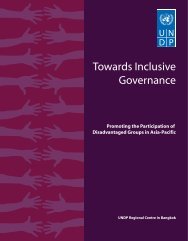Lessons Learned From Rights-Based Approaches in ... - HRBA Portal
Lessons Learned From Rights-Based Approaches in ... - HRBA Portal
Lessons Learned From Rights-Based Approaches in ... - HRBA Portal
You also want an ePaper? Increase the reach of your titles
YUMPU automatically turns print PDFs into web optimized ePapers that Google loves.
aid flows - that many donors are now veer<strong>in</strong>g away from aid delivery <strong>in</strong> pure service<br />
delivery <strong>in</strong>itiatives and harness<strong>in</strong>g such aid delivery towards <strong>in</strong>itiatives that are highly<br />
participatory, often <strong>in</strong>volves the poorest of the poor and that aims at build<strong>in</strong>g<br />
capacities of such groups to produce outcomes that are often more susta<strong>in</strong>able and<br />
viable.<br />
Challenges <strong>in</strong> Implement<strong>in</strong>g <strong>Rights</strong>-<strong>Based</strong> Programm<strong>in</strong>g Strategies: <strong>Lessons</strong><br />
<strong>Learned</strong><br />
� Us<strong>in</strong>g confrontational means can <strong>in</strong>vite resistance: The landless groups often<br />
use advocacy methods rooted <strong>in</strong> confrontational means like blockades, gheraos and<br />
protests to raise awareness on their plight and to highlight service failures on the part<br />
of the duty-bearers. While such means have highlighted their cause, they have also<br />
met with resistance and obstruction from duty-bearers and other groups (like the<br />
powerful shrimp-farm owners). Many groups have met with violence for <strong>in</strong>dulg<strong>in</strong>g <strong>in</strong><br />
such forms of advocacy and protests.<br />
� Us<strong>in</strong>g the legal system still not widely undertaken: Under a rights-based<br />
approach to realiz<strong>in</strong>g rights, the legal system is used to a large extent to access justice,<br />
especially for the poor, vulnerable and marg<strong>in</strong>alized groups. Nijera Kori appears to be<br />
somewhat constra<strong>in</strong>ed when it comes to us<strong>in</strong>g the legal system on behalf of such<br />
groups. 20 Part of the reason of limited use of the courts to access justice lies <strong>in</strong> the<br />
<strong>in</strong>accessible nature of the Bangladesh legal system itself. Additionally, part of the<br />
problem lies <strong>in</strong> the fact that the network of socially oriented lawyers faces constra<strong>in</strong>ts<br />
<strong>in</strong> reach<strong>in</strong>g out to the remote rural areas of Bangladesh. F<strong>in</strong>ally, such an approach<br />
would detract from the organization’s approach of not undertak<strong>in</strong>g any servicedelivery<br />
<strong>in</strong>itiatives. Revamp<strong>in</strong>g the legal system and mak<strong>in</strong>g it people-friendly is<br />
imperative, especially s<strong>in</strong>ce the poor <strong>in</strong> Bangladesh face <strong>in</strong>surmountable odds <strong>in</strong><br />
access<strong>in</strong>g and us<strong>in</strong>g the legal system to demand and claim rights.<br />
� Focus<strong>in</strong>g on social mobilization without any attendant service delivery<br />
mechanisms poses a challenge: While it is true that the focus on social mobilization<br />
and on collective capabilities have resulted <strong>in</strong> many visible ga<strong>in</strong>s for the poor and<br />
vulnerable groups, the low priority accorded to service delivery aspects of the<br />
organization’s strategy - especially <strong>in</strong> less-developed countries like Bangladesh - can<br />
have an impact on susta<strong>in</strong><strong>in</strong>g members’ <strong>in</strong>terests. This can pose a challenge to<br />
susta<strong>in</strong><strong>in</strong>g the struggles on a long-term basis. To guard aga<strong>in</strong>st such a risk, quite a few<br />
strategies that focus on rights-based approaches 21 and that are used by NGOs do have<br />
service-delivery components to them.<br />
The fact that Nijera Kori hardly has any service delivery components <strong>in</strong> its strategy,<br />
while at the same time, encourages poor and vulnerable groups to break with past<br />
20 This is not to understate the fact that Nijera Kori does not use the legal system; its groups are<br />
currently <strong>in</strong>volved <strong>in</strong> fil<strong>in</strong>g 733 cases and <strong>in</strong> 2005, 75 new cases were filed by the groups. The groups<br />
themselves are f<strong>in</strong>ancially support<strong>in</strong>g 499 cases and Nijera Kori are help<strong>in</strong>g support 234 more. Nijera<br />
Kori and the groups have also <strong>in</strong>itiated four writ petitions <strong>in</strong> the courts.<br />
21 Please refer to the case study of Sankaalp <strong>in</strong> the India Education Case Study <strong>in</strong> this volume of case<br />
studies. Other Indian NGOs like the MV Foundation or Pratham <strong>in</strong> India, while also apply<strong>in</strong>g rightsbased<br />
approach to deliver<strong>in</strong>g education for poor and vulnerable groups of children, do have servicedelivery<br />
aspects <strong>in</strong> their strategy like the sett<strong>in</strong>g up of non-formal schools.<br />
28



